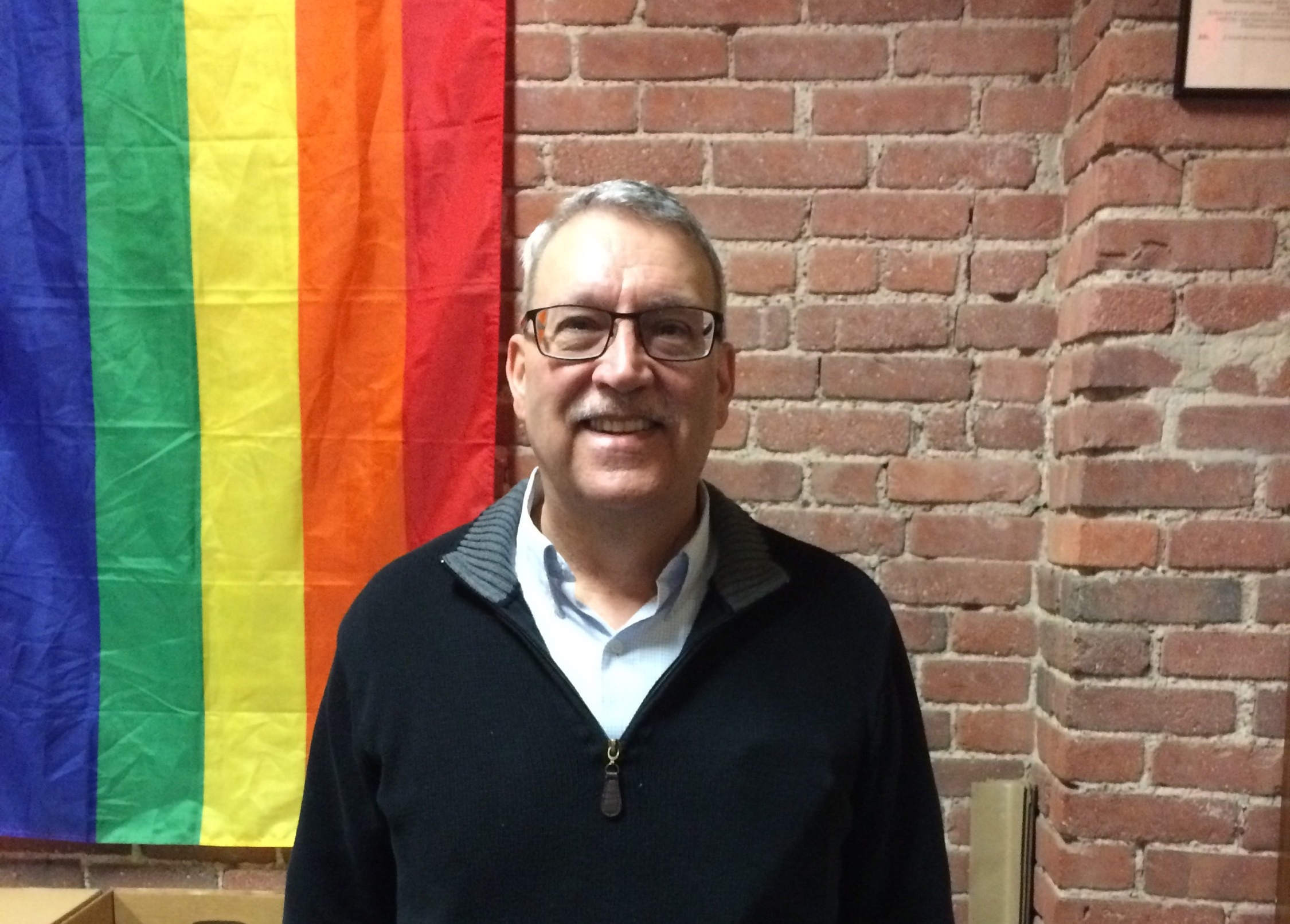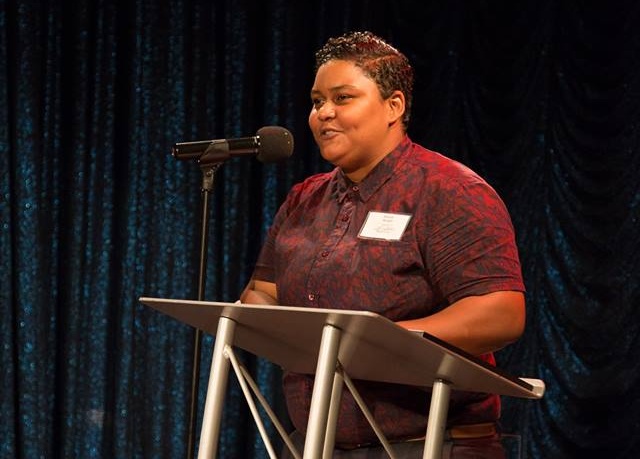Sort by:
Love Among the Ruins: The Robert John Quinn Memorial Books
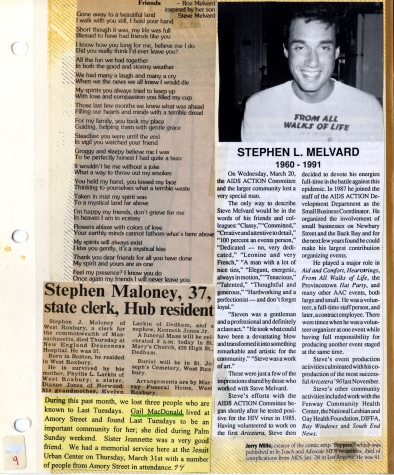
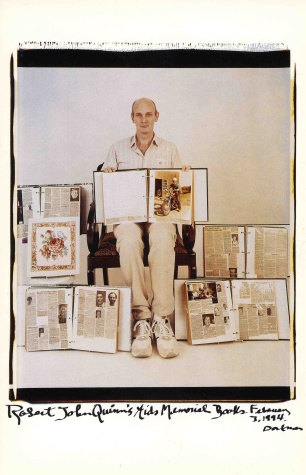
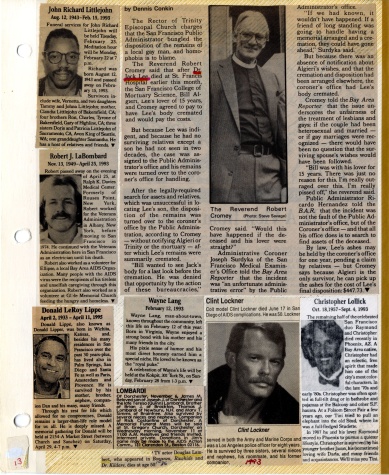
Explore the digital collection.
Many of the obituaries detail the lives of LGBTQ people, AIDS activists, or allies killed by hate crimes, accidents, or illnesses of indeterminate origin. But most are memorials to men who died of AIDS: famous ones like rock legend Freddie Mercury, local heroes like AIDS activist and educator Sidney Borum, Jr., and regular guys like Harvey Lucas, a 31-year- old military veteran and bookbinder from Washington, D.C.
The obituaries gathered in Robert John Quinn’s Memorial Books, as the collection is known, represent a miniscule fraction of the roughly 19 million worldwide deaths from HIV and AIDS between 1981 and the dawn of 2000. But flipping through just a few pages, one immediately senses the epidemic’s horrifying scale and the ferocity with which it felled gay men in the prime of their lives.
Thanks to a grant from Mass Humanities and a dedicated cadre of volunteers supervised by William Holden, chair of THP’s Archives and Research Committee, the entire collection has been digitized in a searchable format and is available online for use by researchers, students, scholars, and the general public.
“It’s a way to keep our history in public view,” Holden said of the digitization project. “This history isn’t taught in schools. We’re really committed to making sure our history is not erased as it always has been, and making it available to the broader community.”
Quinn, a Bostonian, donated his collection to THP in 2000, when he stopped clipping obituaries. He titled the collection the Robert John Quinn AIDS Memorial Books. However, the name was changed during the digitization, when the extent to which it contained obituaries for people who died of causes other than HIV/AIDS, or whose deaths weren’t explicitly attributed HIV/ AIDS, became more apparent.
“We didn’t want people to make assumptions that everyone in these books died of HIV or AIDS, since that’s not actually the case,” said Holden.
A permanent digital record
Digitizing the collection, which has been used regularly by researchers and others interested in LGBTQ history, was important to ensuring its availability to future generations. Quinn stored the obituaries in non-archival photo albums with adhesive pages. Over the years, the adhesive ate away at the newsprint or simply dried up, causing obituaries to spill out of the books. Others were seemingly hopelessly stuck to the adhesive pages and needed to be carefully separated. Eventually, the collection will be preserved in archival sleeves, a process volunteers are on track to complete soon. All told, digitizing the collection and publishing the online finding aid comprised 532 hours.
“The height of the AIDS epidemic happened before they were even born,” said Holden. “It was very moving to watch their expressions as they were going through and reading the obituaries.”
Cole Papadopoulos, who digitized a significant portion of the books, rode a rollercoaster of emotions. Her excitement at encountering the familiar face of Joseph Beam, editor of the seminal In the Life: A Black Gay Anthology, turned to distress when she learned he died alone, his body undiscovered for weeks.
But even amidst the endless death, Papadopoulos glimpsed the resilience that has long enabled the LGBTQ community to survive decades of oppression, violence, misunderstanding, and a plague.
“I felt the love present in so many obituaries that were written by the deceased’s friend or partner,” Papadopoulos said. “I laughed and felt admiration when I read the obituaries that insisted on humor, lovingly joking about the deceased’s bitchy personality or annoying stubbornness—including a totally in-your-face obituary that chiefly focused on sex and drug use. It was pre-written in advance by the person who died.”
Explore the digital collection here.
Top Related Stories
Donor Spotlight: Ray Niro
On October 1, 1977, when Ray Niro heard a knock on the door of his Back [...]
On October 1, 1977, when Ray Niro heard a knock on the door of his Back [...]
Allison Wright: “The LGBTQ Movement Is in Desperate Need of a Makeover”
Last year, during the 2017 HistoryMaker Awards ceremony, The History Project awarded the Lavender Rhino Award [...]
Last year, during the 2017 HistoryMaker Awards ceremony, The History Project awarded the Lavender Rhino Award [...]
